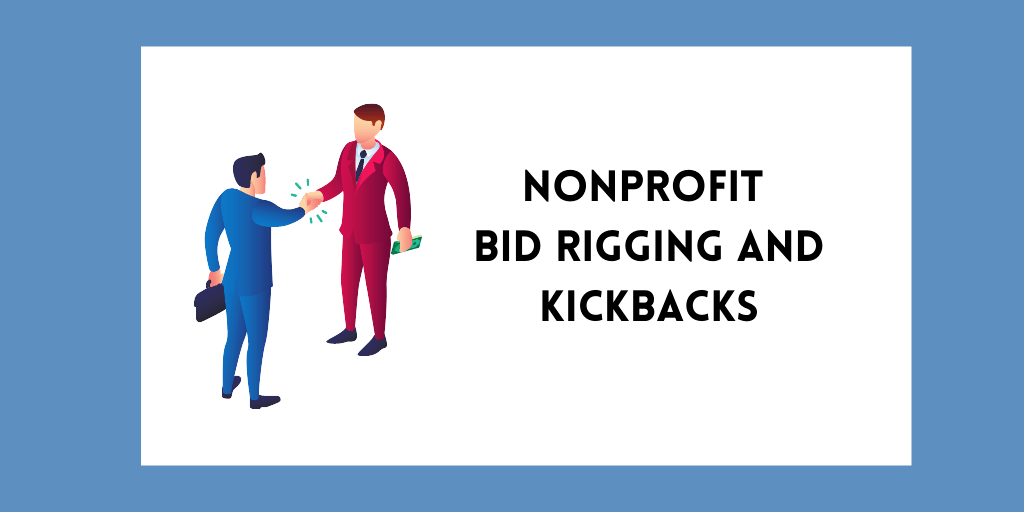
When is a Gift a Bribe?
By Charles Hall | Auditing , Corruption
When is a gift a bribe?
Vendors often give sporting event tickets to clients. Or maybe they take them out for a nice dinner. Others might pay for a trip to Vegas.
So, at what point does a gift become a bribe? A friend of mine recently asked me this question. He said, "I give football tickets to clients. Is that a bribe?" I responded, "Maybe not, but if you give them season-long tickets, probably yes." (Such tickets cost several thousand dollars.) My friend followed with, "What if I go to every game with them?" My answer was, "That makes no difference." And doing so could be worse.
Cozy Vendor Relationships
20% of the 2022 fraud cases in the ACFE's recent study revealed "unusually close association with a vendor" as a red flag.
I've lost count of the fraud cases involving close vendor-client relationships. For example, the vendor and client might take annual family vacations together (think Aspen ski trip), with the former footing the bill.
I once spoke at a conference with vendors in the audience. One of them asked, "What can vendors give?" I responded, "I can't give you a list, but I would never give cash." He wanted a list of acceptable gifts. So, here's one: planes, trains, and automobiles. Yes, I'm trying to be funny, though I know of one vacation home gifted to a CEO. Why? So, a construction company could win a bid.
Some presents (like a vacation home) are obviously a bribe, but lower-cost ones are more difficult to define.
Gray Gift Decisions
You may wonder, "How can I know when a gift is okay?" There's no easy answer to this question. But consider these scenarios. A vendor offers one of the following to you:
-A sleeve of golf balls
-Takes you to play golf
-Pays for you to attend a PGA tournament at Pebble Beach and all expenses for a week-long trip (including your spouse and children)
-Pays your annual dues at your local country club (cost is $25,000 annually)
I'll take the sleeve of balls and play golf, but I'm uncomfortable with the other two.
Front Page Litmus Test
When there is a gray ethical decision, I always say, "Put it on the front page of the paper and see how you feel." If you're comfortable with it, you're probably okay. If not, then don't do it. Another step you might take is to ask an honest friend what they think, someone who has no vested interest. (If you're unwilling to ask your friend the question, your conscience is probably telling you, "This is not okay.")
Most vendors want to give gifts without crossing the line (they want to avoid going to jail). But the line is not usually defined, and naming particulars can be futile. After all, how many things could be on such a list? So, creating a list of proper (or improper) gifts may not work.
So, how do we know if a gift is a bribe?
Quid Pro Quo
In the context of bribery, the concept of "quid pro quo" plays a significant role. This Latin phrase means a direct exchange, where something is given with the expectation of receiving something in return. To determine if a gift can be considered a bribe, one key question is: Was the gift given with the expectation of receiving something in return?
It's easier to argue that a gift is not a bribe if it's small or of low value. In such cases, it may appear more like a token of appreciation than an inducement for a particular action. However, when a vendor gives an expensive gift, it becomes much more challenging to assert that there's no expectation of something in return. Expensive gifts raise red flags and make it more likely that the present is, in fact, a bribe.
So, your company should create a gift policy, defining what is acceptable and unacceptable.
Gift Policies
Gift policies should limit amounts to a specific dollar amount, such as $100 annually. As I said earlier, cash (at least, in my mind) is never an acceptable gift.
The gift policy might provide examples of proper activity with a vendor, such as playing golf together once or twice a year. It might also provide examples of improper actions, such as going on vacations with vendors.
You could list unacceptable gifts, but this is challenging. I would instead define inappropriate gifts in terms of dollars. Doing so is a blanket covering all types of activity.
Moreover, consider including actions the company might take if the employee violates the policy. You may want to say that violations could lead to the loss of their job. But, consult with your legal advisors about the written policy.
And remember to communicate the policy.
Communicate the Gift Policy
Give your written gift policy to new employees, and discuss the importance of transparency regarding vendor gifts. Additionally, remind existing employees of the policy. You might do so in annual training classes.
So, should companies require written disclosure of gifts received?
Gift Disclosure Forms
Companies might also require a signed disclosure form once a year where employees provide details of what they receive from vendors. (Here’s a sample disclosure form.) Additionally, provide such disclosures to your compliance department if you have one. If not, consider giving these to the company owner.
And who might you require to complete such a disclosure form? Anyone with the power to purchase, whether a person issuing a purchase order, a department head authorizing payments, or someone signing checks--anyone able to pay a vendor (or cause a vendor to be paid).
Again, consult with your legal advisors about your disclosure form and processes.
So, is bribery a significant threat to most businesses?
Bribery is Real
ACFE fraud surveys continue to reveal that bribery is one of the leading causes of fraud. 50% of the ACFE's 2022 fraud cases involved corruption (bribery is a form of corruption). Why is this so?
Because it's easy for employees to receive illegal payments (or gifts) without anyone's knowledge, but make no mistake: This activity adversely affects the employer. How? The vendors usually pass the bribe cost to the company through inflated prices or substandard goods. Strangely enough, the vendor often sees a bribe as a cost of doing business, albeit an illegal one.



